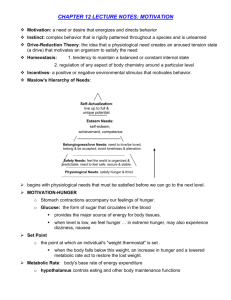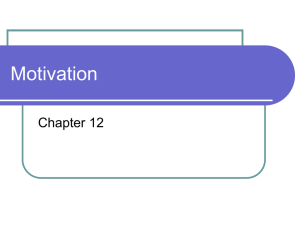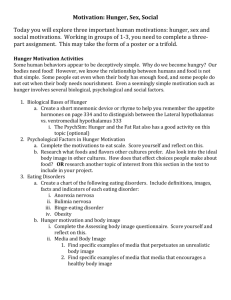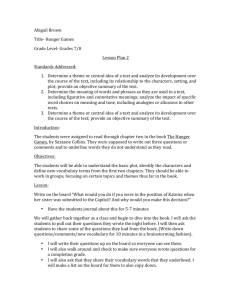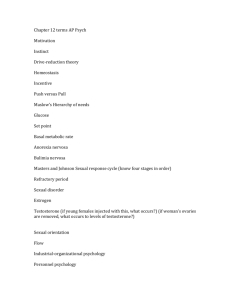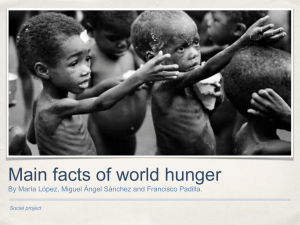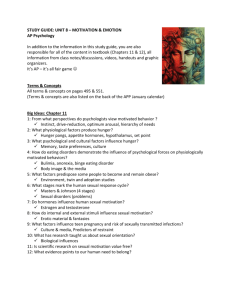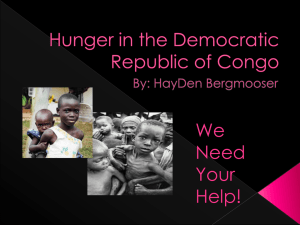Unit 8 notes - anadentappsych12
advertisement
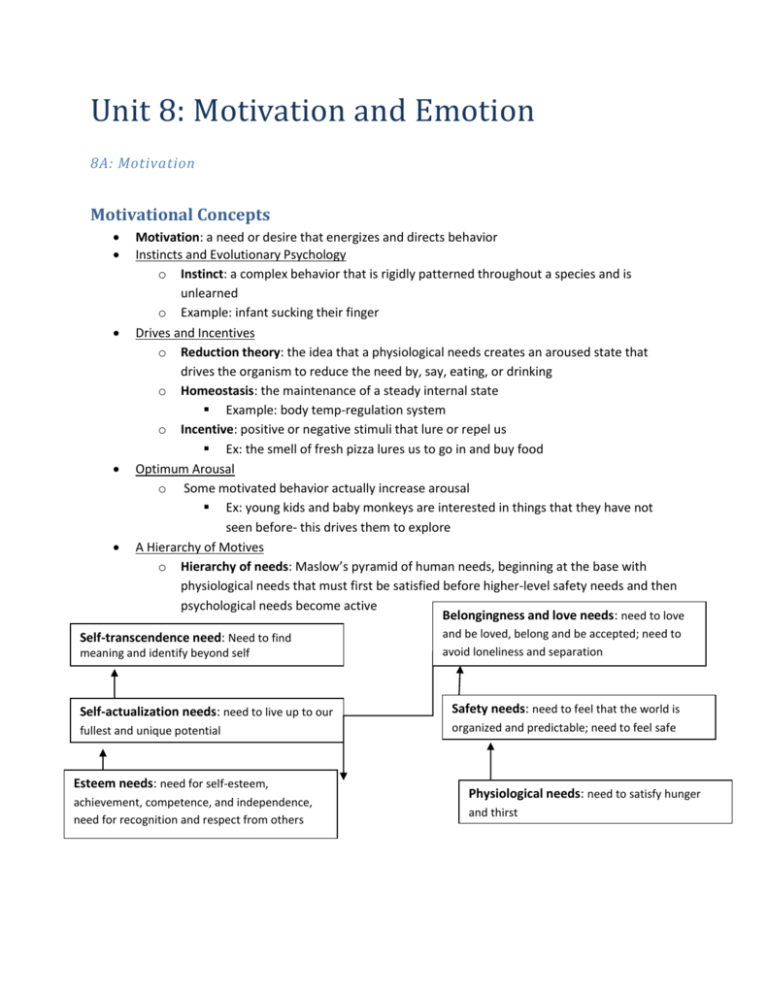
Unit 8: Motivation and Emotion 8A: Motivation Motivational Concepts Motivation: a need or desire that energizes and directs behavior Instincts and Evolutionary Psychology o Instinct: a complex behavior that is rigidly patterned throughout a species and is unlearned o Example: infant sucking their finger Drives and Incentives o Reduction theory: the idea that a physiological needs creates an aroused state that drives the organism to reduce the need by, say, eating, or drinking o Homeostasis: the maintenance of a steady internal state Example: body temp-regulation system o Incentive: positive or negative stimuli that lure or repel us Ex: the smell of fresh pizza lures us to go in and buy food Optimum Arousal o Some motivated behavior actually increase arousal Ex: young kids and baby monkeys are interested in things that they have not seen before- this drives them to explore A Hierarchy of Motives o Hierarchy of needs: Maslow’s pyramid of human needs, beginning at the base with physiological needs that must first be satisfied before higher-level safety needs and then psychological needs become active Belongingness and love needs: need to love Self-transcendence need: Need to find meaning and identify beyond self and be loved, belong and be accepted; need to avoid loneliness and separation Self-actualization needs: need to live up to our Safety needs: need to feel that the world is fullest and unique potential organized and predictable; need to feel safe Esteem needs: need for self-esteem, achievement, competence, and independence, need for recognition and respect from others Physiological needs: need to satisfy hunger and thirst Hunger The Physiology of Hunger o What factors produce hunger? o The Brain Chemistry and the brain People and animals try to regulate calories intake because then they can prevent energy deficits and maintain body weight Body keeps track of substances Like glucose o form of sugar that circulates in the blood and when its level is low, we feel hunger Your brain triggers hunger by monitoring your body’s internal state and chemistry 2 district hypothalamic centers Lateral hypothalamus: bring hunger Ventromedial hypothalamus: depresses hunger set point: the point at which an individual’s “weight thermostat” is supposedly set – when the body falls below their weight, an increased in hunger and a lowered metabolic rate may act to restore the lost weight. our bodies regulate weight through the control of food intake, energy output, and basal metabolic rate the rate of energy expenditure for maintain basic body functions when the body is at rest o The Psychology of Hunger What psychological and culture factors influence hunger? Taste preferences: biology and culture Body chemistry and environment play into not only that we are hunger, but what we are hungry for. Our preferences for salty and sweet tastes are genetic and universal The ecology of eating o The presence of others amplifies our natural after a party or feast we may realize we have overeaten called social facilitation Eating Disorders Anorexia Nervosa o Starts as a diet usually (weight-loss) till you end up starving yourself because you have the constant feeling of being “fat” Bulimia Nervosa o Binge-eating followed by puking o Feelings of guilt, disgust, and distress Binge-eating disorder o Large amount of eating w/out excessive exercise (with no puking or fasting) Percents: o 0.6% meet anorexia criteria o 1% meet bulimia nervosa criteria o 2.8% meet binge-eating disorder criteria Obesity and weight control Influenced by genes and environment Lack of exercise w/ abundance of high calories food Twins and adoption studies indicate body weight is genetically influenced Losing weight o Permanent weight loss is not easy and most of the time NOT permanent because it requires a change in lifestyle, whereas people tend to go back to their old ways Sexual Motivation The Physiology of Sex o The Sexual Response Cycle Steps Excitement o o o o Plateau Orgasm Resolution Refractory period: resting period after an orgasm where a man cannot have another orgasm for a time being (can be minutes but can be days) Hormones Estrogen: woman Testosterone: men The Psychology of Sex Adolescents Sexuality Teen pregnancy Reasons for o Ignorance o Minimal communication about birth control o Guilt related to sexual activity o Alcohol use o Mass media norms of unprotected promiscuity Sexual Orientation Sexual Orientation: An enduring sexual attraction toward members of one’s own sex (homosexual) or their other sex (heterosexual) old beliefs to why homosexual exist relationship with parents fear/hatred of other gender sex hormones in the blood molested/seduced/sexually victimized as a child all found not true Need to Belong Aiding Survival o Social bonds boost the survival rate o Those who form attachments are likely to reproduce and co-nurture their offspring to maturity o Married people less likely at risk for depression, suicide, early death compared to unattached people Wanting to Belong o We want to feel included, accepted, and loved by those important to us, our self-esteem will rise because of it. Sustaining Relationships o When the fear of being along seems worse than the pain of emotional pr physical abuse, attachments can keep people in abusive relationships o Our fear of being along has some basis in reality Children whom move through series of foster home, with repeated disruption of budding attachments, may come to have difficulty forming deep attachments Threatens to dissolve social ties – overwhelms us The Pain of Ostracism o Ostracism: social exclusion both in natural and laboratory settings o When socially excluded, people may engage in self-defeating behaviors or in antisocial behaviors
